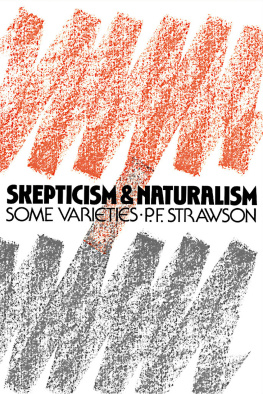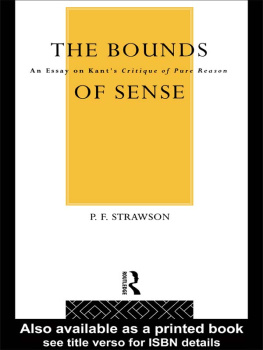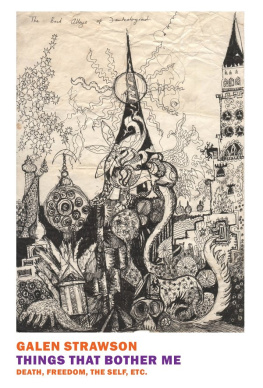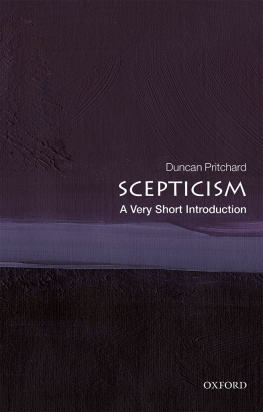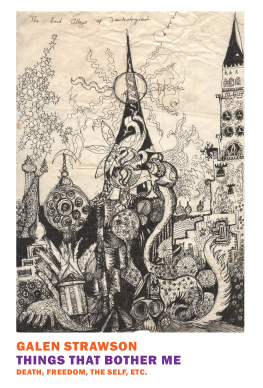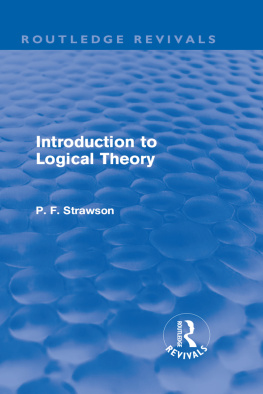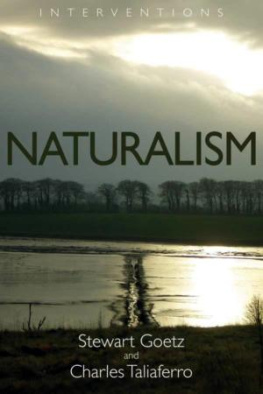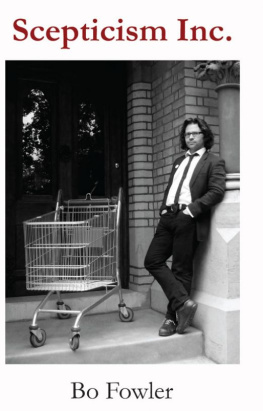Strawson - Scepticism and Naturalism
Here you can read online Strawson - Scepticism and Naturalism full text of the book (entire story) in english for free. Download pdf and epub, get meaning, cover and reviews about this ebook. publisher: Taylor & Francis (CAM), genre: Religion. Description of the work, (preface) as well as reviews are available. Best literature library LitArk.com created for fans of good reading and offers a wide selection of genres:
Romance novel
Science fiction
Adventure
Detective
Science
History
Home and family
Prose
Art
Politics
Computer
Non-fiction
Religion
Business
Children
Humor
Choose a favorite category and find really read worthwhile books. Enjoy immersion in the world of imagination, feel the emotions of the characters or learn something new for yourself, make an fascinating discovery.
Scepticism and Naturalism: summary, description and annotation
We offer to read an annotation, description, summary or preface (depends on what the author of the book "Scepticism and Naturalism" wrote himself). If you haven't found the necessary information about the book — write in the comments, we will try to find it.
Strawson: author's other books
Who wrote Scepticism and Naturalism? Find out the surname, the name of the author of the book and a list of all author's works by series.
Scepticism and Naturalism — read online for free the complete book (whole text) full work
Below is the text of the book, divided by pages. System saving the place of the last page read, allows you to conveniently read the book "Scepticism and Naturalism" online for free, without having to search again every time where you left off. Put a bookmark, and you can go to the page where you finished reading at any time.
Font size:
Interval:
Bookmark:

SKEPTICISM AND
NATURALISM
WOODBRIDGE LECTURES
DELIVERED AT COLUMBIA UNIVERSITY
IN APRIL OF 1983
NUMBER TWELVE
BY THE SAME AUTHOR
The Bounds of Sense
An Essay on Kant's Critique of Pure Reason
Freedom and Resentment and Other Essays
Individuals
An Essay in Descriptive Metaphysics
Introduction to Logical Theory
Logico-Linguistic Papers
Subject and Predicate in Logic and Grammar
NATURALISM:
SOME VARIETIES
THE WOODBRIDGE
LECTURES 1983
P.F.Strawson
METHUEN
First published in Great Britain in 1985 by
Methuen & Co. Ltd
11 New Fetter Lane, London EC4P 4EE
First published as a University Paperback in 1987
This edition published in the Taylor & Francis e-Library, 2005.
To purchase your own copy of this or any of Taylor & Francis or Routledge's collection of thousands of eBooks please go to www.eBookstore.tandf.co.uk.
1985 P.F.Strawson
All rights reserved. No part of this book may be reprinted or reproduced or utilized in any form or by any electronic, mechanical or other means, now known or hereafter invented, including photocopying and recording, or in any information storage or retrieval system, without permission in writing from the publishers.
British Library Cataloguing in Publication Data
Strawson, P.F.
Skepticism and naturalism: some varieties:
the Woodbridge lectures 1983.(The
Woodbridge lectures; no. 12)
1. Naturalism
I. Title II. Series
146 B828.2
ISBN 0-203-98059-X Master e-book ISBN
ISBN 0-416-00002-9 (Print Edition)
.
This book consists of five of the Woodbridge Lectures delivered at Columbia University in 1983. A sixth lecture, Causation and Explanation, somewhat remote in theme and treatment from the others is not included. I wish to thank the members of the philosophy department at Columbia for their invitation to deliver these lectures and for the pleasure and stimulus of their company and comments during my stay in New York.
The lectures were originally composed in Oxford during the early months of 1980 and were subsequently delivered in that University. Though a good many of the thoughts they contain have been given, sometimes fuller, sometimes abbreviated, expression in others of my articles and reviews, they have not before been brought together and presented in print in their present form. The original composition of the lectures was prompted by a growing sense of a certain unity in the approaches, which I found plausible or appealing, to several apparently disparate topics; and by a hope, no doubt delusive, that some persistent philosophical tensions might be eased by an exposure of the parallels and connections between these approaches.
Other disciplines are defined by constitutive principles of se lection among ascertainable truths. Agreement among experts in the special sciences and in exact scholarship may reasonably be hoped for and gradually attained. But philosophy, which takes human thought in general as its field, is not thus conveniently confined; and truth in philosophy, though not to be despaired of, is so complex and many-sided, so multi-faced, that any individual philosopher's work, if it is to have any unity and coherence, must at best emphasize some aspects of the truth, to the neglect of others which may strike another philosopher with greater force. Hence the appearance of endemic disagreement in the subject is something to be expected rather than deplored; and it is no matter for wonder that the individual philosopher's views are more likely than those of the scientist or exact scholar to reflect in part his individual taste and temperament.
The satirist may laugh, the philosopher may preach; but reason herself will respect the prejudices and habits, which have been consecrated by the experience of mankind.GIBBON
Skepticism, Naturalism and Transcendental Arguments
INTRODUCTORY REMARKS
The term naturalism is elastic in its use. The fact that it has been applied to the work of philosophers having as little in common as Hume and Spinoza is enough to suggest that there is a distinction to be drawn between varieties of naturalism. In later chapters, I shall myself draw a distinction between two main varieties, within which there are subvarieties. Of the two main varieties, one might be called strict or reductive naturalism (or, perhaps, hard naturalism). The other might be called catholic or liberal naturalism (or, perhaps, soft naturalism). The words catholic and liberal I use here in their comprehensive, not in their specifically religious or political, senses; nothing I say will have any direct bearing on religion or the philosophy of religion or on politics or political philosophy.
Each of these two general varieties of naturalism will be seen by its critics as liable to lead its adherents into intellectual aberration. The exponent of some subvarieties of strict or reductive naturalism is liable to be accused of what is pejoratively known as scientism, and of denying evident truths and realities. The soft or catholic naturalist, on the other hand, is liable to be accused of fostering illusions or propagating myths. I do not want to suggest that a kind of intellectual cold war between the two is inevitable. There is, perhaps, a possibility of compromise or dtente, even of reconciliation. The soft or catholic naturalist, as his name suggests, will be the readier with proposals for peaceful coexistence.
My title seems to speak of varieties of skepticism as well as varieties of naturalism. An exponent of some subvariety of reductive naturalism in some particular area of debate may sometimes be seen, or represented, as a kind of skeptic in that area: say, a moral skeptic or a skeptic about the mental or about abstract entities or about what are called intensions. I shall explore some of these areas later on; and it is only then that the distinction between hard and soft naturalism will come into play.
For the present, I shall not need any such distinction and I shall not make any such slightly deviant or extended applications of the notion of skepticism. To begin with, I shall refer only to some familiar and standard forms of philosophical skepticism. Strictly, skepticism is a matter of doubt rather than of denial. The skeptic is, strictly, not one who denies the validity of certain types of belief, but one who questions, if only initially and for methodological reasons, the adequacy of our grounds for holding them. He puts forward his doubts by way of a challengesometimes a challenge to himselfto show that the doubts are unjustified, that the beliefs put in question are justified. He may conclude, like Descartes, that the challenge can successfully be met; or, like Hume, that it cannot (though this view of Hume's was importantly qualified). Traditional targets of philosophic doubt include the existence of the external world, i.e. of physical objects or bodies; our knowledge of other minds; the justification of induction; the reality of the past. Hume concerned himself most with the first and third of thesebody and induction; and I shall refer mainly, though not only, to the first.
I shall begin by considering various different kinds of attempts to meet the challenge of traditional skepticism by argument; and also various replies to these attempts, designed to show that they are unsuccessful or that they miss the point. Then I shall consider a different kind of response to skepticisma response which does not so much attempt to meet the challenge as to pass it by. And this is where I shall first introduce an undifferentiated notion of Naturalism. The hero of this part of the story is Hume: he appears in the double role of arch-skeptic and arch-naturalist. Other names which will figure in the story include those of Moore, Wittgenstein, Carnap and, among our own contemporaries, Professor Barry Stroud. This part of the story is the theme of the present chapter. It is an old story, so I shall begin by going over some familiar ground. In the remaining chapters I shall tackle a number of different topics viz. morality, perception, mind and meaningand it is only in connection with these that I shall introduce and make use of the distinction between hard and soft naturalism.
Font size:
Interval:
Bookmark:
Similar books «Scepticism and Naturalism»
Look at similar books to Scepticism and Naturalism. We have selected literature similar in name and meaning in the hope of providing readers with more options to find new, interesting, not yet read works.
Discussion, reviews of the book Scepticism and Naturalism and just readers' own opinions. Leave your comments, write what you think about the work, its meaning or the main characters. Specify what exactly you liked and what you didn't like, and why you think so.

